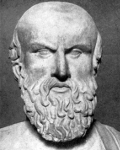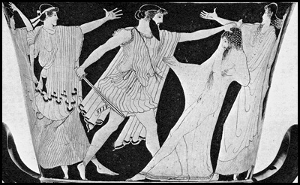Aeschylus: the 'Father of Tragedy'
The foremost playwright, in the eyes of a great many drama historians, was Aeschylus. A prime innovator and multiple prize-winner, he is often called the "Father of Tragedy." 
Aeschylus is thought to have been born in about 525 B.C., in a part of Attica known as Eleusis. His father was named Euphorion (a name that Aeschylus would give to his own son). When the Persians invaded, Aeschylus went to war. He fought at the Battle of Marathon and then at the naval battles of Artemisium and Salamis. He was judged a hero for his participation in these battles. Some stories even say that he lost a hand at Salamis. These military endeavors formed the basis of his earliest known prize-winning play, The Persians, which was first performed in 472 B.C. It was unusual in that its plot centered on current events; nearly all other Greek plays focused on events that had taken place long before. Aeschylus is thought to have written up to 90 or so plays in his lifetime. Only a handful survive. He was also the author of many satyr plays. 
He is most well-known for a trilogy titled the Oresteia, first performed in 458 B.C. The three plays that make up the Oresteia are Agamemnon, The Libation Bearers, and the Eumenides. The story follows the family events of the title character, Orestes, whose father, Agamemnon, made certain sacrifices in order to encourage the Greek victory over Troy. Other well-known plays written by Aeschylus include The Suppliants and Seven against Thebes. He has long been said to have also written Prometheus Bound. Many scholars think that his surviving individual plays were part of other trilogies, the rest of which are now lost. At the major annual festival City Dionysia, Aeschylus is said to have entered dozens of plays in total and to have won the top prize 13 times. Aeschylus was not the first Greek writer of tragic plays. He was, however, an innovator. The Chorus was a mainstay of Greek plays. The ancient playwright Thespis introduced the first actor, known as the protagonist. This allowed onstage discussion between the protagonist and the chorus. Aeschylus took this one step further and introduced the second actor, the deuteragonist, allowing interaction between two main characters and between those characters and the Chorus. He later adopted the use of the third actor (tritagonist), introduced by his contemporary and competitor Sophocles. Aeschylus is also credited with inventing standards for scenery and costumes. He is said to have invented or been the first to make repeated use of a crane to lift actors and of a wheeled platform to change stage scenery. He is also thought to have routinely acted in his own plays. As well, he is famous for the vivid imagery of both his words and the scenes that they described. One of the themes he visited several times was hubris; a few of his plays, notably The Persians, illustrated the much later saying, "Pride goes before a fall." Another notable theme found in his writings was vengeance (notably in the Oresteia) and its motivations and consequences. Aeschylus was married, but his wife's name has not survived. They had two sons, both of whom followed in their father's literary footsteps. The older son, Euphorion, won top prize at City Dionysia in 431, besting famous poets Euripides and Sophocles. Aeschylus had died by that time, while in Gela, on the island of Sicily, in 456 B.C. He wrote his own epitaph, which, keeping with the focus of the times, focused on his military service, not his literary output.
|
|
Social Studies for Kids
copyright 2002–2026
David White




